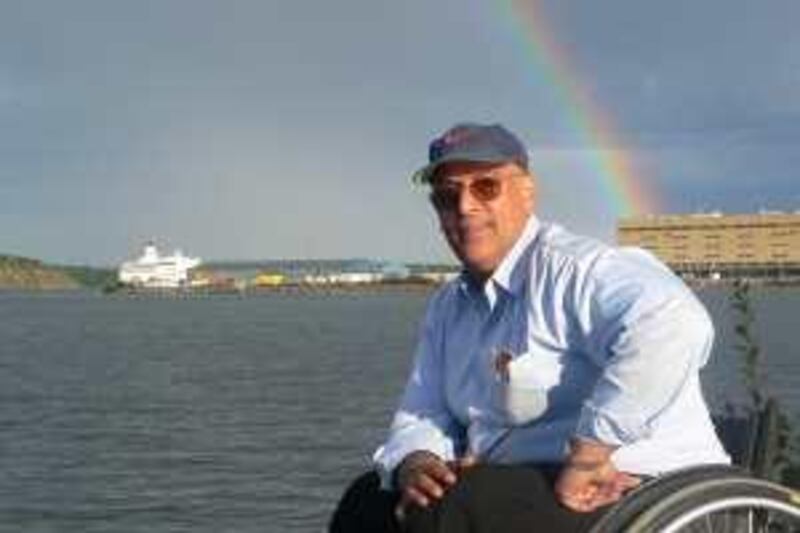MUSCAT // A leading activist for the disabled in Oman is urging the government to establish rehabilitation centres for car crash victims as road accidents continue to be a major cause of paralysis. "As more victims of road accidents become paralysed or have their limbs amputated, it is a surprise that Oman still does not have rehabilitation units," Mukhtar al Rawahi, a member of the National Committee for the Welfare of the Disabled, said.
Mr Rawahi was paralysed in 1972 at age 20 after the car he was driving skidded and overturned on an icy road, while he was studying in the United Kingdom. "I was in a rehabilitation programme for many weeks in the United Kingdom, which helped me a lot," Mr Rahawi, who is also a Road Safety Association committee member and a former president of the Oman Disabled Association, said. For 30 years, he has been campaigning for better facilities and support for people with physical disabilities so they can live independent lives.
"People here in Oman are not rehabilitated after leaving the hospitals and are left to do it themselves. They start having all sorts of problems because they don't know how to deal with it," said Mr Rahawi, who is employed full time as video editor with state-run Oman Television. "Picking up the pieces after the accident is a major part of it and without proper rehabilitation it can lead to loss of confidence and a will to live."
Juma'a al Mazrui, 47, an administrator at the Ministry of Justice Affairs, has been paralysed from the waist down since a speeding lorry ploughed into his car 11 years ago. He agrees with Mr Rawahi that there is a lack sufficient rehabilitation programmes. "I was chucked out of the hospital just a month later and went straight to my home," he said. "There were no home follow-ups or special bedding facilities or a wheelchair. The physiotherapy stopped after I was discharged from the hospital and I could not afford the special toilet facilities as well."
Salma Marhoon, 41, said it took her three years to come to terms with the accident that took away her left leg in 2002. She said she would have benefited from a rehabilitation programme to cope mentally with the loss of her limb. "I was clinically depressed for almost three years and could not go out. Severe accident victims must receive psychological counselling to come to terms with their losses so they can move on," Ms Marhoon, a teacher, said.
According to the Royal Oman Police, there were 9,783 injuries from a total of 7,982 road accidents last year compared with 10,558 injuries from 7,253 accidents in 2008. The traffic department does not keep statistics on how many accidents resulted in paralysis, but officials from nine hospitals in the country said about 320 people in 2009 received permanent disabilities from road accidents ranging from blindness and paraplegia to limb amputations. The figure is about five per cent more than the previous year, doctors said.
"Some of the cases are horrific, and with no comprehensive rehabilitation units in hospitals or home-care programme, the victims and their carers are bound to struggle to lead a normal life. It can lead to psychological problems," Dr Ali Hekmani, a doctor in the accident and emergency ward at the Royal Oman Police Hospital in Muscat, said. While a government road safety programme is under way, Mr Mazrui said drivers must change their ways to prevent horrifying injuries from ruining lives.
"Everybody is in hurry and very few drivers have respect of the traffic regulations. Campaigns may help but attitude must change about how we drive on the roads." Mr Rawahi also urged the government to plan roads properly proper and build enough roads to reduce congestion. "How can we improve road safety when we have a three-lane road that suddenly ends up a two-lane road in the middle of a motorway? We need proper planning and the construction of more roads instead of relying on the same old road network," Mr Rawahi said.
@Email:sshaibany@thenational.ae





